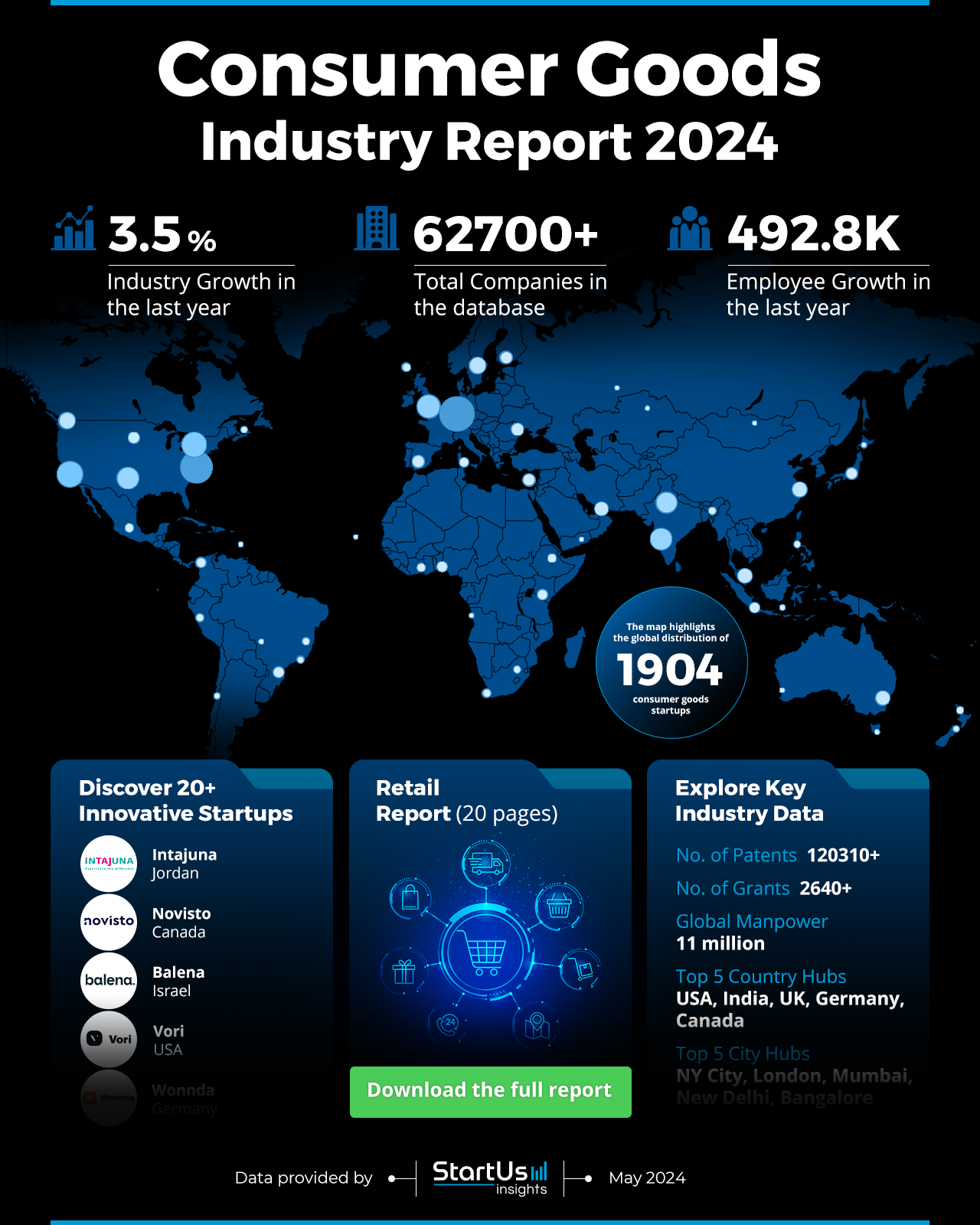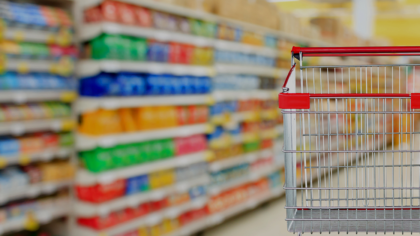Accelerate Productivity in 2025
Reignite Growth Despite the Global Slowdown
The 2024 Consumer Goods Industry Outlook presents insights into current trends, market dynamics, and future opportunities. The consumer goods report offers firmographic data, investment patterns, and the key trends and players shaping the sector. With data-driven assessments and analysis, it provides a research-based review of the industry. Also, it provides details about the investment opportunities within the global consumer goods market.
This report was last updated in July 2024.
This consumer goods industry report serves as a reference for stakeholders within the industry, investors, policymakers, and economic analysts, providing a snapshot of the industry’s health to map its trajectory for innovation and growth in the coming years.
StartUs Insights Consumer Goods Industry Report 2024
- Executive Summary
- Introduction to the Consumer Goods Industry Report 2024
- What data is used in this Consumer Goods Industry Report?
- Snapshot of the Global Consumer Goods Industry
- Funding Landscape in the Consumer Goods Industry
- Who is Investing in the Consumer Goods Industry?
- Emerging Trends in the Consumer Goods Industry
- 5 Consumer Goods Startups impacting the Industry

Executive Summary: Consumer Goods Industry Outlook 2024
This report is created using data obtained from the Big Data and AI-powered StartUs Insights Discovery Platform, covering more than 4.7 million global companies, as well as 20K+ technologies and emerging trends. We also analyzed a sample of 1900+ consumer goods startups developing innovative solutions to present five examples from emerging consumer goods industry trends.
- Industry Growth Overview: The consumer goods industry demonstrates a growth of 3.5%, with more than 62700+ companies listed.
- Manpower & Employment Growth: The industry employs a workforce exceeding 11 million. Also, it welcomed 493K new employees in the last year.
- Patents & Grants: It received over 120310 patents and more than 2640 grants.
- Global Footprint: Key countries include the US, India, the UK, Germany, and Canada, along with major city centers like New York City, London, Mumbai, New Delhi, and Bangalore.
- Investment Landscape: The industry sees a financial activity with over 17590 funding rounds and an average investment value of USD 58.7 million per round.
- Top Investors: Major investors including Alibaba Group, General Atlantic, Silver Lake, and more have collectively invested more than USD 13 billion.
- Startup Ecosystem: Top startups in the sector include Intajuna (B2B e-commerce ordering application), Novisto (sustainability management platform), Balena (conventional plastic solution), Vori (grocery operating system), and Wonnda (consumer goods manufacturing platform).
- Recommendations for Stakeholders: Investors should diversify their investments and prioritize firms with good ESG practices. Entrepreneurs should develop eco-friendly products and leverage omnichannel e-commerce. Companies should also focus on technological advancement to improve supply chain efficiencies and prioritize consumer-centric approaches.
Explore the Data-driven Consumer Goods Outlook for 2024
The Consumer Goods Industry Report 2024 uses data from the Discovery Platform and encapsulates the key metrics that underline the sector’s dynamic growth and innovation. The heatmap provides a visual representation of key metrics and showcases the landscape of the global industry. Our database encompasses a total of 62700+ companies, including 1904 startups.
The database records over 120310+ patents that demonstrate innovation in the sector. Further, the total grants awarded is 2640+ while highlighting financial investment in development and research. Over the past year, the industry experienced a growth rate of 3.5%.
In terms of manpower, the industry’s global workforce is 11 million employees with over 493K employees added in the last year. Also, the heatmap highlights the top five country hubs—USA, India, UK, Germany, and Canada—as well as the top five city hubs—New York City, London, Mumbai, New Delhi, and Bangalore. These regions represent key centers of activity and innovation within the industry.
What data is used to create this consumer goods report?
Based on the data provided by our Discovery Platform, we observe that the consumer goods industry ranks among the top 5% in the following categories relative to all 20K topics in our database. These categories provide a comprehensive overview of the industry’s key metrics and inform the short-term future direction of the industry.
- News Coverage & Publications: The consumer goods industry has been featured in more than 5200 publications over the last year.
- Funding Rounds: The industry closed over 17590 funding rounds.
- Manpower: The sector includes more than 11 million workers. It added over 492.8K new employees in the last year.
- Patents: The industry involves over 120310 patents.
- Grants: The sector received 2640+ grants.
- Yearly Global Search Growth: The industry’s yearly search growth rate stands at 149.37%.
A Snapshot of the Global Consumer Goods Industry
The consumer goods outlook showcases a workforce of over 11 million individuals globally. It demonstrated growth by adding approximately 493K new employees over the past year. This increase highlights the industry’s operations and employment area. Our database currently includes over 62700 companies that indicate the industry ecosystem.
Explore the Funding Landscape of the Consumer Goods Industry
The average investment per funding round stands at USD 58.7 million. The sector includes more than 6200 investors. With over 17590 funding rounds closed, the data highlights the capital flow required for ongoing development and expansion. More than 6740 companies received investment. This suggests a ground for innovation and entrepreneurship.
Who is Investing in the Consumer Goods Industry?
The consumer goods sector cumulatively invested more than USD 13.2 billion in value. Here are the details of the leading investors and their engagements:
- Alibaba Group invested a total of USD 2.5 billion across 5 companies.
- General Atlantic demonstrates broad participation with investments totaling USD 2 billion in 13 different companies.
- Silver Lake concentrated investments in 3 companies amounting to USD 1.3 billion.
- Advent International invested USD 1.3 billion in 5 companies.
- SoftBank Vision Fund invested USD 1.3 billion across 10 companies.
- Tiger Global Management extended its influence across 20 companies with an investment totaling USD 1.3 billion.
- Tencent focused investments totaling USD 1.2 billion in 6 companies.
- Kering invested USD 1.2 billion in 3 companies.
- Insight Partners contributed USD 1.1 billion to 18 companies.
Access Top Consumer Goods Innovations & Trends with the Discovery Platform
Explore the key trends within the consumer goods industry along with the firmographic insights:
- Circular Economy involves a total of 20067 companies. These companies collectively employ approximately 2.2 million individuals, with an addition of 121900 new employees last year. The sector witnessed an annual trend growth rate of 9.07%.
- The Field Force Management trend involves 2215 companies. These companies employ over 203800 individuals, with a growth of 14600 new employees in the past year. The annual trend growth rate stands at 7.02%.
- Foodtech evolves with 17999 companies and a workforce of 2.4 million. The past year saw the addition of 121100 new employees, despite an annual trend growth rate of 0.91%.
5 Top Examples from 1900+ Innovative Consumer Goods Startups
The five innovative startups showcased below are picked based on data including the trend they operate within and their relevance, founding year, funding status, and more. Book a demo to find promising startups, emerging trends, or industry data specific to your company’s needs and objectives.
Intajuna offers a B2B eCommerce Ordering App
Jordanian startup Intajuna develops a fast-moving consumer goods (FMCG) grocery ordering application that provides next-day delivery. This enables stores, cafes, and restaurants to replenish their inventory. The process starts by downloading the Intajuna app, followed by account creation. Once registered, retailers select the items at wholesale prices. The order placement process within the app ensures a smooth transaction from selection to checkout. Orders arrive within 24 hours to enhance the supply chain of the FMCG market while reducing procurement costs.
Novisto develops a Sustainability Management Platform
Canadian startup Novisto builds an environmental, social, and governance (ESG) reporting & data management platform. It leverages micro-services architecture and AI to enhance the organization’s ESG data handling and offers extensible data schema for integration. This SaaS platform streamlines data collection and ensures insights through its configurable tools. It also provides a searchable ESG data warehouse to facilitate automatic ESG data parsing and indexing. With this, Novisto assists organizations in developing their ESG strategy and reporting using AI-powered technology.
Balena creates Conventional Plastic Solution
Israeli startup Balena develops biopolymer materials, BioCir, to provide a compostable alternative to conventional plastics. It processes through controlled compost environments for complete biodegradation with no environmental impact. The flexible thermoplastic elastomer, BioCirflex, replaces harmful materials for products requiring durability and flexibility. It facilitates production via injection molding, extrusion, and 3D printing and supports diverse manufacturing processes. The properties of BioCirflex include a variable shore hardness for creating rigid consumer products such as buttons and sunglasses frames. It also creates advanced films used in technical textiles such as polyvinyl chloride (PVC) and ethylene-vinyl acetate (EVA).
Vori provides a Grocery Operating System
US startup Vori develops a modern grocery operating system. This cloud-based platform combines inventory management, point-of-sale, shopper marketing, and loyalty systems. The platform minimizes food waste and addresses inefficiencies in the food supply chain. In addition, Vori uses its grocery data to improve access to healthy food in underserved areas. Thus, it enhances the profitability, efficiency, and competitiveness of independent retailers.
Wonnda builds a Consumer Goods Manufacturing Platform
German startup Wonnda provides a digital sourcing platform to source, manage, and scale consumer brands’ product lines. The platform offers direct connections with suppliers and showcases product ideas, including private label and custom products. Through Wonnda, brands create smart tenders, submit requests for quotations (RFQs), and receive multiple offers from suppliers without any middlemen involved. This system enhances transparency and accelerates the decision-making process as it centralizes communications and documents. Its digital project room features chats, video meetings, and file sharing. Additionally, Wonnda offers a project collaboration tool for stakeholders to ensure alignment and management of sourcing activities. The company assists new brands, scaling brands, retailers, and suppliers to find manufacturing partners.
Looking for Comprehensive Insights into Consumer Goods Trends, Startups, or Technologies?
The 2024 Consumer Goods Industry Outlook highlights a market characterized by innovation, sustainability initiatives, and shifting consumer demands. Technological advancement, enhanced supply chain management, and consumer-centric approaches continue to drive success. Get in touch to explore all 1900+ startups and scaleups, as well as all industry trends impacting consumer goods companies.




![AI in Retail: A Strategic Guide for Industry Leaders [2025-2030]](https://www.startus-insights.com/wp-content/uploads/2025/04/AI-in-Retail-SharedImg-StartUs-Insights-noresize-420x236.webp)




